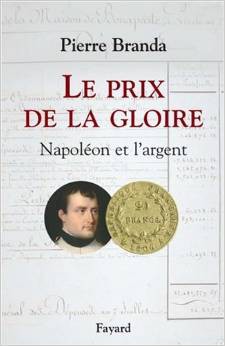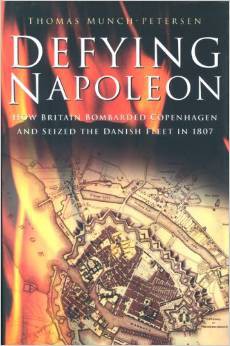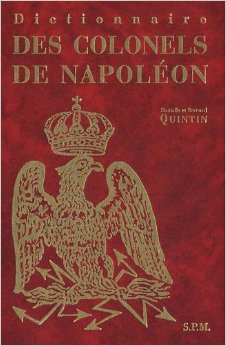History Prizes 2007
 FONDATION NAPOLÉON GRAND PRIX
FONDATION NAPOLÉON GRAND PRIX
Pierre BRANDA, Le prix de la gloire, Napoléon et l’argent, Paris, Fayard
With his greatcoat and his hat, Napoleon passes for a simple man, not in the least influenced by “filthy lucre”. And yet, money was the emperor?s constant companion. To forget this is to forget that the French Revolution, to which Napoleon owed everything, was the direct consequence of a financial crisis which the Ancien Régime was unable to solve. To forget this is to forget that the devaluation of paper money was one of the principal factors for the Directory?s discredit, which itself favoured the arrival of a man able to re-establish order. To forget this is to forget that the military expeditions planned or led by Bonaparte (Italy or Santo Domingo) were organised for economic reasons or failed for serious lack of funds (Egypt). Such amnesia however would also unjustly minimise the consular regime?s contribution to the re-establishment of national finances. It would be to forget the extraordinary feat performed by Napoleon of financing fifteen years of war without bankrupting the state, when twenty years earlier French assistance in the American war of Independence, on a relatively modest military level, had brought a thousand-year-old French monarchy to its knees.
Read an interview with Pierre Branda here.
 PRIZE FOR A BOOK IN A LANGUAGE OTHER THAN FRENCH
PRIZE FOR A BOOK IN A LANGUAGE OTHER THAN FRENCH
Thomas MUNCH-PETERSEN, Defying Napoleon. How Britain Bombarded Copenhagen and Seized the Danish Fleet in 1807, London: Sutton Publishing
In the later summer of 1807 a new era of British international politics dawned with the aggressive bombing of Copenhagen by British forces. This book by Thomas Munch-Petersen, senior lecturer in Scandinavian History at University College London, UK, is one of the first ever monographs in English on the subject. It deals in detail with the Anglo-Danish diplomatic wranglings which preceded the show of force, Danish relations with France and finally the bombardment itself. The book is based on extensive original research in British and mainly Scandinavian archives and offers new evidence and interpretations. Most of all, it tells the story of Napoleon Bonaparte’s “ferocious will”, Alexander I’s “devious and nebulous ambitions” and George Canning?s “determination” at the time of this famously unprovoked aggression against a neutral state and the terror bombardment of a civilian population.
 SPECIAL JURY PRIZE
SPECIAL JURY PRIZE
Bernard et Danielle QUINTIN, for their lives’ work:
Dictionnaire des colonels de Napoléon (1996, Editions SPM)
A biographical dictionary of 1,574 colonels and adjudants commandants in service during the First Empire. It details their regiments, their provenance (social and military), their promotions, their subsequent history after the fall of the empire, their parliamentary roles, their distinctions, their deaths and gravestones.
Dictionnaire des capitaines de vaisseaux de Napoléon (2003, Editions SPM)
A biographical dictionary of 194 capitaines de vaisseaux (ship’s captains) in the French navy during the First Empire. Includes tables giving geographical origin and gives details concerning their professions, their political roles, their distinctions, sanctions, etc. The work opens with an exceedingly useful prosopographical study.
Austerlitz, 2 décembre 1805 : dictionnaire biographique des soldats de Napoléon tombés au champ d’honneur (2004, Archives et Cultures Editions)
A biographical dictionary of the 1,057 French officers, NCOs and rank and file killed or mortally wounded at Austerlitz.
Dictionnaire des soldats français morts à la bataille d’Eylau (2006, Archives et Cultures Editions)
This work begins with a resumé of the Polish campaign in January and February 1807, giving totals for the forces present and the various phases of the battle of Eylau. It then continues with a biographical dictionary of all the soldiers in the Grande Armée killed at Eylau giving date and place of birth, the circumstances of their death and their military career. Included amongst the many appendices is an index of those killed at Eylau arranged by département. The work is intended as a homage to the memory of those Frenchmen who gave their lives for the victory at Eylau.
